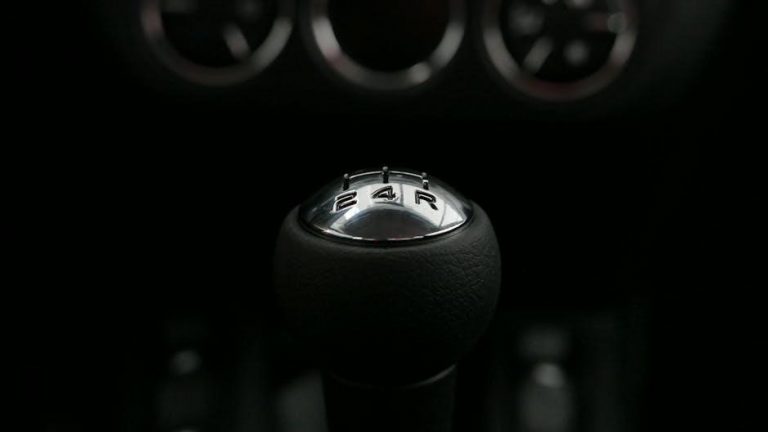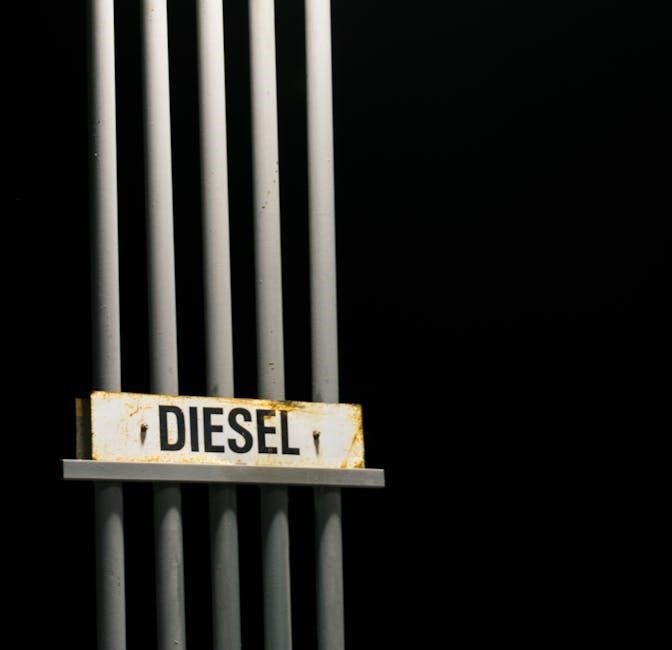
Welcome to the 2001 Gas Club Car Owner Manual. This guide provides essential information for safe operation‚ maintenance‚ and troubleshooting. Follow the guidelines for optimal performance and longevity.
Purpose and Scope of the Manual
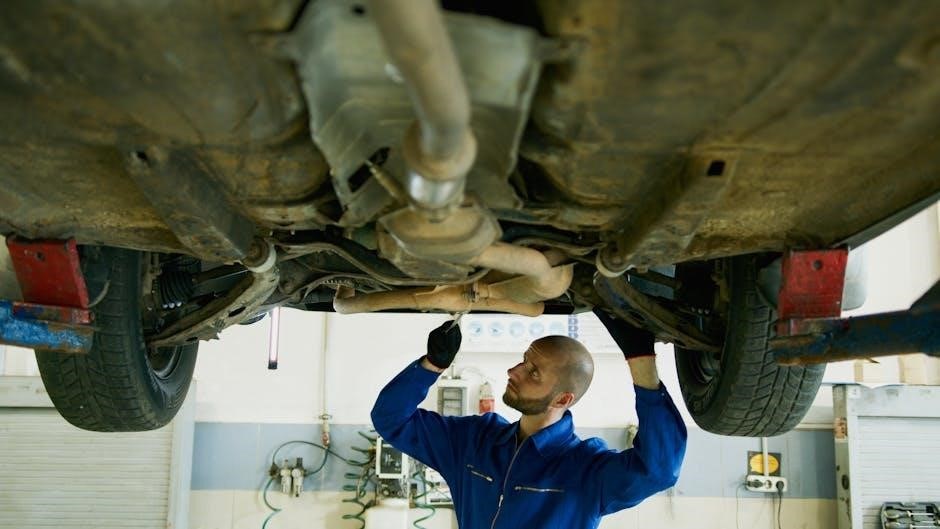
This manual is designed to provide comprehensive guidance for the 2001 Gas Club Car‚ covering essential operation‚ maintenance‚ and safety practices. It serves as a reference for both new and experienced users‚ ensuring safe and efficient vehicle use. The scope includes detailed procedures for routine checks‚ troubleshooting‚ and environmental considerations. By following this manual‚ owners can maximize performance‚ extend the vehicle’s lifespan‚ and maintain compliance with safety standards. Regular updates and adherence to the guidelines are crucial for optimal functionality.
Important Safety Precautions
Always wear protective gear‚ including gloves and eyewear‚ when maintaining or repairing your 2001 Gas Club Car. Ensure proper ventilation when handling fuel or working on the engine to avoid inhaling harmful fumes. Follow all safety guidelines in this manual to prevent accidents. Never exceed the vehicle’s load capacity or operate at unsafe speeds; Regularly inspect brakes and tires for optimal performance and safety. Failure to adhere to these precautions may result in injury or damage to the vehicle.
Vehicle Overview
The 2001 Gas Club Car is a versatile golf cart designed for reliability and performance. This manual covers the DS Gasoline model‚ providing detailed specs and guidelines.
2001 Club Car DS Gasoline Model Specifications
The 2001 Club Car DS Gasoline model is a reliable and high-performing vehicle. It features a robust gasoline-powered engine that delivers powerful performance. The transmission system is designed for smooth gear transitions‚ enhancing the driving experience. A durable suspension system provides stability and a comfortable ride. The reliable braking system ensures safety. Regular maintenance is essential to uphold the vehicle’s optimal functionality and longevity.
Key Features and Components
The 2001 Club Car DS Gasoline model is equipped with a robust engine‚ ensuring efficient performance. It features a durable transmission system for smooth operation. The vehicle includes a reliable braking system for enhanced safety. The suspension system provides a comfortable ride‚ while the electrical system supports essential functions. Additional components such as seats‚ storage options‚ and accessories contribute to its functionality. Regular maintenance is crucial to maintain optimal performance and extend the vehicle’s lifespan.
Key Components of the 2001 Gas Club Car
The 2001 Club Car DS Gasoline model features a robust engine‚ reliable transmission‚ durable braking system‚ efficient electrical components‚ and a sturdy suspension system for optimal performance.
Engine and Fuel System Overview
The 2001 Club Car DS Gasoline model is equipped with a robust engine designed for reliable performance. The fuel system ensures efficient combustion and power delivery. Regular maintenance‚ such as oil changes and filter replacements‚ is crucial for longevity. Use the recommended fuel type and oil viscosity to maintain optimal engine health. Always refer to the manual for specific guidelines on fuel capacity and system care to ensure smooth operation and prevent potential issues.
Electrical System and Battery Maintenance
Regular inspection of the electrical system is crucial for optimal performance. Check battery terminals for cleanliness and tightness. The battery should be charged according to the manual’s guidelines. Ensure all electrical connections are secure to prevent malfunctions. Use only authorized Club Car parts for replacements. Monitor battery voltage and replace cells as needed. Proper maintenance extends the lifespan of the electrical components and ensures reliable operation. Always follow safety protocols when handling batteries and electrical systems.
Transmission and Brake System
Regular inspection of the transmission and brake system ensures safe and efficient operation. Check transmission fluid levels and top up as needed. Inspect brake pads for wear and replace them when necessary. Look for any signs of fluid leaks or damage. Ensure proper alignment of brake components. Refer to the manual for specific maintenance intervals. Always use authorized Club Car parts for replacements. Proper care extends the system’s lifespan and maintains reliable performance. Follow safety guidelines when performing inspections or repairs.
Steering and Suspension
Regular inspection of the steering and suspension system is crucial for maintaining stability and control. Check tie-rods‚ ball joints‚ and steering gear for wear or damage. Lubricate all moving parts periodically to ensure smooth operation. Inspect suspension components for proper alignment and tighten any loose connections. Maintain recommended tire pressure for optimal handling. Address any issues promptly to prevent uneven tire wear and ensure safe driving conditions. Follow the manual’s guidelines for routine maintenance and adjustments.
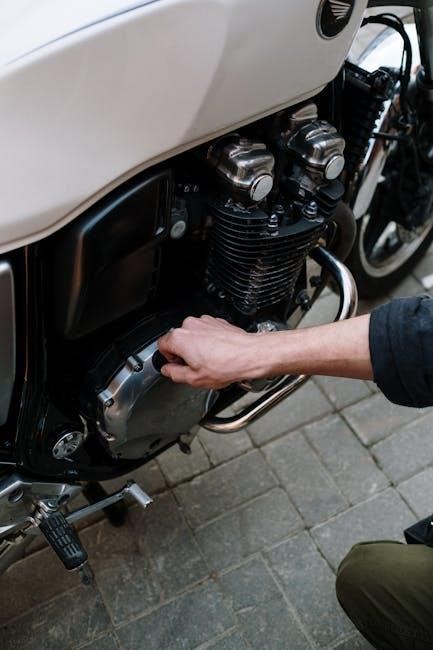
Fuel and Oil Specifications
Use regular unleaded gasoline with a minimum octane rating of 87. The engine oil capacity is approximately 1.5 quarts‚ requiring 5W-30 viscosity for optimal performance. Refer to the manual for exact specifications and recommendations to ensure proper vehicle operation and longevity. Always adhere to guidelines for fuel and oil to maintain efficiency and prevent damage.
Recommended Fuel Types
For optimal performance‚ use regular unleaded gasoline with a minimum octane rating of 87. Avoid using ethanol-blended fuels or diesel‚ as they can damage the engine. Ensure the fuel is fresh and stored properly to prevent contamination. Refer to the manual for specific guidelines on fuel quality and handling. Always follow these recommendations to maintain engine efficiency and avoid potential damage. Proper fuel selection is crucial for the longevity and reliability of your 2001 Gas Club Car.
Oil Capacities and Viscosity Requirements
The 2001 Gas Club Car requires 1.4 quarts of oil for the engine. Use a high-quality detergent oil with a viscosity of 10W-30 or 10W-40 for optimal performance in all temperatures. Synthetic oils are acceptable but not required during the break-in period. Always check oil levels before operation to ensure proper lubrication. Refer to the manual for specific oil change intervals and guidelines for maintaining your vehicle’s engine health and longevity.
Regular Maintenance Schedule
Follow a routine schedule for oil changes‚ filter replacements‚ and tire pressure checks. Inspect brakes‚ suspension‚ and battery monthly to ensure optimal performance and longevity of your vehicle.
Daily and Pre-Operation Checks
Before each use‚ inspect the tire pressure‚ oil level‚ and fuel level. Check brakes‚ lights‚ and suspension for proper function. Ensure the battery terminals are clean and secure. Inspect the air filter for cleanliness and the coolant level if applicable. Test all controls for smooth operation. Always perform a pre-operation safety check to identify and address potential issues early. Refer to the manual for a detailed inspection checklist.
Weekly and Monthly Maintenance Tasks
Perform a weekly inspection of the oil level‚ air filter‚ and battery terminals. Check the tire pressure and look for wear on brakes and suspension. Every 50 hours of operation‚ change the oil and replace the oil filter. Inspect the spark plug and fuel filter monthly. Lubricate moving parts like the steering and suspension components. Refer to the manual for specific intervals and procedures to ensure optimal vehicle performance and longevity. Regular maintenance prevents unforeseen issues and extends the vehicle’s lifespan.
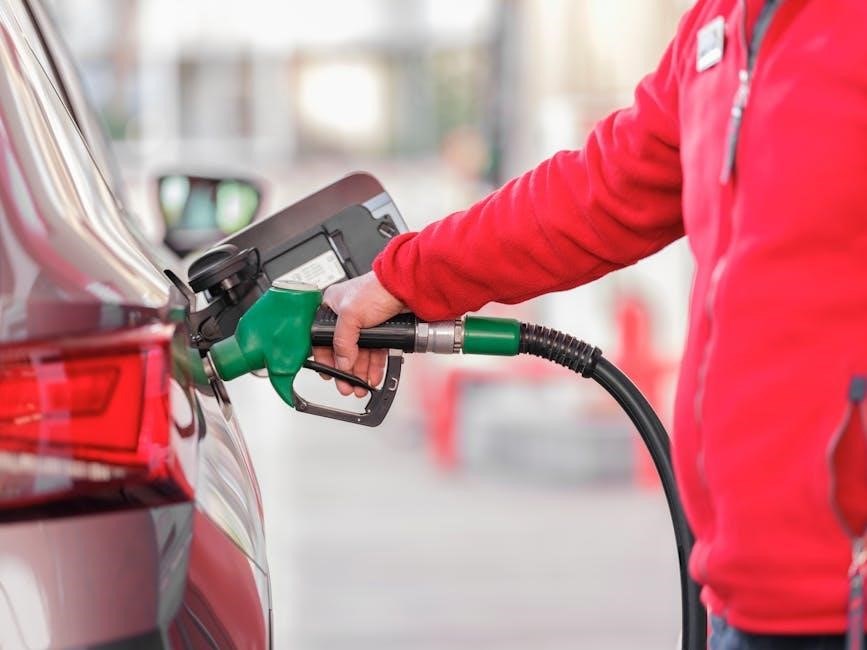
Troubleshooting Common Issues
Identify common issues like engine not starting or poor performance. Check fuel system‚ spark plugs‚ and air filter. Inspect battery connections and electrical components for faults. Ensure proper brake function and fluid levels. Refer to the manual for detailed diagnostic steps to resolve problems efficiently and safely. Regular checks help prevent major repairs. Always follow safety guidelines during troubleshooting.
Diagnosing Electrical System Problems
Start by inspecting battery connections‚ terminals‚ and cables for damage or corrosion. Check the spark plug and ignition system for proper function. Use a multimeter to test voltage and continuity in circuits. Look for blown fuses or tripped circuit breakers. Ensure all electrical components are securely connected. Consult the manual for specific diagnostic steps and safety precautions. Addressing electrical issues promptly prevents further damage and ensures reliable vehicle operation. Always follow safety guidelines when working with electrical systems.
Addressing Engine Performance Issues
Check the fuel system for blockages or contamination. Ensure the air filter is clean and properly installed. Inspect the spark plug for wear or fouling and replace if necessary. Verify the oil level and viscosity meet specifications. If issues persist‚ consult the manual for detailed troubleshooting steps. Addressing problems early prevents costly repairs and ensures optimal engine performance. Always follow safety guidelines when working with engine components. Regular maintenance is key to maintaining reliability and extending the vehicle’s lifespan.
Accessories and Customization
This section explores approved accessories and customization options for the 2001 Gas Club Car. Enhance functionality and aesthetics with storage solutions‚ seating upgrades‚ or performance enhancements. Refer to the manual for compatibility and installation guidelines to ensure safety and optimal vehicle performance. Customization can personalize your Club Car to meet specific needs or preferences. Explore options carefully to maintain warranty and safety standards.
Approved Accessories for the 2001 DS Gas Model
Approved accessories for the 2001 DS Gas Model include windshields‚ storage solutions‚ lighting kits‚ and seats. These enhancements improve functionality and comfort while maintaining safety standards. Ensure all additions are compatible with your vehicle’s specifications. For a list of authorized accessories‚ refer to the Club Car dealer network or the official manual. Always prioritize compatibility and safety when customizing your Club Car to avoid voiding warranties or compromising performance.
Customization Options and Upgrades
The 2001 DS Gas Model offers various customization options to personalize your vehicle. Popular upgrades include lift kits‚ custom seats‚ alloy wheels‚ and storage solutions. For enhanced performance‚ consider upgrading the exhaust system or installing high-performance air filters. Ensure all modifications comply with Club Car specifications to maintain safety and warranty validity. Refer to the official manual or consult an authorized Club Car dealer for guidance on compatible upgrades and installation best practices.
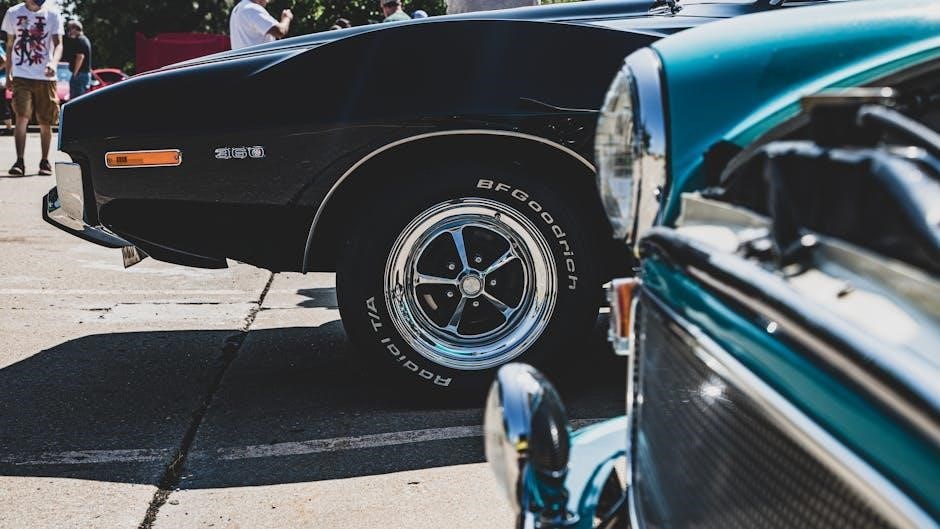
Environmental and Safety Considerations
Adhere to eco-friendly practices to minimize environmental impact. Ensure proper disposal of hazardous materials like oil and filters. Always follow local regulations and safety guidelines.
Proper Disposal of Hazardous Materials
Properly dispose of hazardous materials like used oil‚ filters‚ and batteries. Refer to local regulations for approved disposal methods. Ensure materials are contained to prevent environmental contamination. Always follow the owner’s manual guidelines for safe handling and disposal procedures. Proper disposal helps protect the environment and comply with legal requirements. Use designated recycling centers for hazardous waste. Never dispose of these materials in regular trash or drain systems. Adhere to eco-friendly practices to minimize environmental impact.
Eco-Friendly Practices for Gas-Powered Vehicles
Adopt eco-friendly practices to minimize environmental impact. Regular tune-ups ensure optimal fuel efficiency and reduce emissions. Maintain proper tire pressure to improve gas mileage. Avoid aggressive driving and idling for extended periods. Use eco-approved accessories and follow recommended maintenance schedules. Dispose of hazardous materials responsibly. Adhere to local environmental regulations and consider upgrading to energy-efficient components. These practices help reduce carbon footprint and promote sustainable vehicle ownership while maintaining performance.
Thank you for using the 2001 Gas Club Car Owner Manual. By following these guidelines‚ you ensure optimal performance and longevity. For further assistance‚ visit official Club Car resources.
Final Tips for Optimal Performance
Regularly inspect and maintain your Club Car to ensure peak performance. Always use recommended fuel and oil to prevent engine damage. Check brakes and tires frequently for safety. Keep the electrical system clean and secure. Address minor issues promptly to avoid major repairs. Refer to the manual for specific guidelines and procedures. Proper care will extend the life of your vehicle and enhance its reliability. Safe driving practices are essential for optimal performance and longevity.
Where to Find Additional Resources
For further assistance‚ contact your local authorized Club Car dealer or visit the official Club Car website. Additional resources‚ including digital manuals and illustrated parts lists‚ are available for download. Refer to the manual for contact information and support options. Ensure to use only approved Club Car parts and follow recommended maintenance schedules for optimal performance. The service manual provides detailed procedures for repairs and upgrades‚ ensuring your vehicle remains in top condition.
